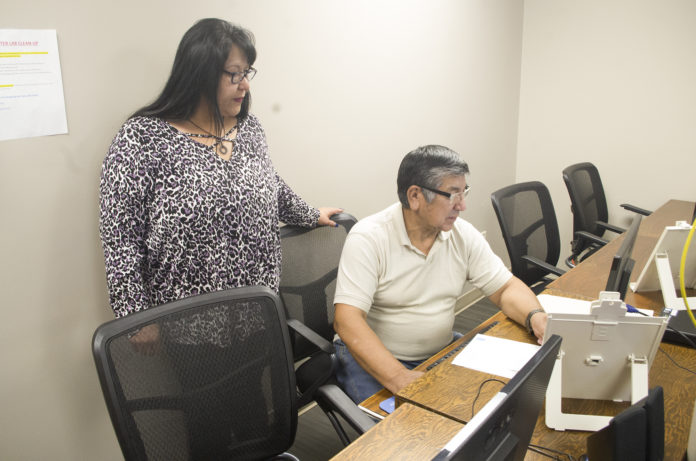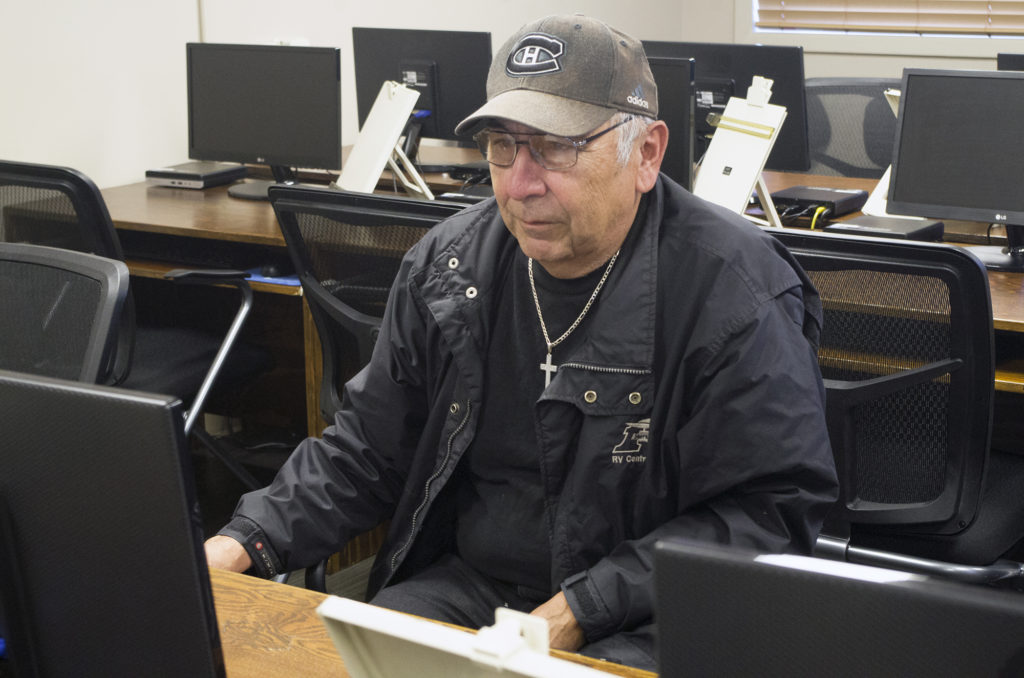
Shelley Gordon was concerned about her two newest employees.
As a the owner of a car wash, she’s seen younger workers come and go without being able to meet the job’s physical demands. These new workers were older—more experienced, for sure, but not as physically fit. She was worried.
“As we age, sometimes things ache and we don’t really realize how many steps in a day my workers take out there, back and fourth,” Gordon says. “I’ve had people who are very physically fit, but they can’t do the job because of the walking on the cement. It’s hard on your knees and your hips and your feet.”
Fortunately, she didn’t need to worry. It’s been two months since that first employee arrived (three weeks for the second) and they’re both still going strong. It’s an unexpected success for Gordon, who’s had trouble finding reliable workers that last more than a week or two. That wasn’t always the case, she says, but finding good employees isn’t as easy as it used to be.
“Traditionally in the past I’ve had a lot of retired pen guards and that sort of thing,” she says, then starts to chuckle. “The joke at the Pen was always, ‘well, you can go work with Shelly at the car wash when you retire,’ but my supply of Pen guards seems to have dried up.”
Gordon didn’t stumble upon these new workers by accident. They’re just two people out of 40 who took part in the Community Service Centre’s (CSC) Older Workers Program. She found out about it when a program rep stopped by her business to talk about it.
Gordon says she’s tried hiring younger employees without much success. They aren’t as reliable, she says, and too many of them act entitled.
The Older Workers Program has provided a major, if unexpected, boost to her business. She’s become one of its biggest supporters.
“I just think it’s such an amazing program that people need to utilize,” she says. “They’ll find that sometimes our best workers are the mature workers. I am just really thankful for the program and for the Community Service Centre for offering this to small businesses.”
Taking the next step
The CSC is no stranger to the world of job hunting. They offer a number of programs that help Prince Albert residents find work, but until this year there was nothing specifically targeted at older generations.
The Older Workers Program, which serves residents between the ages of 55 and 64, started in January with the goal of attracting at least 60 participants. As of late-September, they’re well on their way to meeting that mark. They’re even fielding applications from residents in their late 60s and early 70s.
Unlike other programs, such as their Job Funding Club, the Older Workers Program is tailored for individuals, not groups, and the CSC says they’re finding a lot of success with that approach.
“It’s all independent,” vocational counselor Gladys Ledoux says. “Every person comes with their own unique situation.”
As a vocational counselor, Ledoux’s job is to help prepare older workers for the application process. That could mean something as simple as polishing up a resume, to more complicated exercises, like helping residents find skills from their old careers are transferable to newer ones.
The biggest challenge she’s seeing is technological. Many older works have never had to use computers before. Now they’re faced with a world of online job-sites and email applications.
“Way back when, all they had to do was just say, ‘hi’ and ‘this is who I am,’” Ledoux explains. “There was no cover letter. There was no resume. There was no interview. It was meet-and-greet and deciding whether it was a fit position, but now it’s a whole different ball game.”
“The technology has changed,” Service Centre CEO Bill Powalinsky adds. “The expectations of employers—for cover letters and resumes—have changed. Online applications are something that a lot of folks my age never had to do when they were looking for work back in the day, so the computer technology is something that we work to alleviate.”
There are other barriers too. Powalinsky says some employers will outright refuse to hire older workers, regardless of how dedicated they are to the job. He says older workers may struggle with the technology, but they’re still reliable, focused and motivated, and those are skills you can’t really teach.
“Folks tend to want to hire or focus on a younger worker, not realizing the benefits of hiring somebody who’s got experience,” he says.
Helping older workers is the main goal, but not the only one. The CSC tries to work with other Prince Albert agencies as much as possible as a show of support. If those agencies need training or funding, the Older Workers Program will offer what assistance it can.
“We’re kind of a coaching model,” Powalinsky says. “We may sit on the sidelines and help with the signals, but the folks who approach us, they’re in the game (and) they run the play.”
The Older Workers Program is a new feature on the Prince Albert employment landscape, but there’s no guarantee it will be a permanent one. Powalinsky anticipates that the demand will only grow over the next five to 10 years, however they’ll need to establish a long-term funding partnership to keep things going. At this point, they’re optimistic about having a second run in 2020, but otherwise they’re taking it one year at a time.
“When we took a snapshot of our work-prep population last year, it seemed 60 (participants) would be reasonable,” Powalinsky says. “We’re at three-quarters of the way through and we’re about two-thirds of the way home so I think we’ll have no problem arriving at 60 people.”
Switching gears after 25 years

Statistics Canada says nearly half of all workers over the age of 60 continue to work because they have to. These people are called “workers by necessity” and they make up 44.6 per cent of Saskatchewan’s older worker population. Some of these workers are supporting family members who can’t work, while others are still paying for essential expenses (like bills, mortgages and food) that keep them from retiring. Other are not yet eligible for a pension, or have not saved enough money to retire.
Saskatchewan is actually at the lower end of the older “workers by necessity” scale. The highest numbers are in major urban centres, like Toronto, where 53.4 per cent of older workers have to work.
Even if there’s no financial necessity, there are still plenty of reasons older workers seek employment. Public surveys, like the 2017 Labour Force Survey, show workers are retiring an average of three years later now than they did in the 1990s, something researchers attribute to stronger health and extended life expectancy, among other things.
Researchers have also noted the rise of “transitional” or “partial” retirement. These are people who leave jobs they’ve held most of their life for something less strenuous.
Louis Richard is a great example of the latter group. After repairing motorhomes for 25 years as an RV technician, he’s looking to transition to a something less physically demanding, and with more people to talk to.
“I wanted something different,” he says. “It’s a physical toll and a mental toll. It’s great meeting the customers, but sometimes when you work you just don’t see anybody. I thought it was time to get out once I reached a certain stage. Enough for me.”
Richard began his job search two years ago. It didn’t start well. He found himself bogged down in forms and paperwork, and struggled with cover letters and online resumes. He says it probably cost him a few opportunities.
Things have changed since he first began looking for work as a repairman, and catching up has taken some time.
“There’s so much to do and with all the paperwork I thought I’d have to hire a secretary,” he chuckles. “ You’re going to have all this paperwork and everything and that’s what employers want. They don’t greet you in the face anymore and shake your hand, (say) ‘hi, how are you? You’ve got a nice smile. You’ve got a good attitude.’ Usually that got you the job. Today it’s totally different.”
Richard’s story is a common one, and not because of the technological hurdle. Like the two Older Workers Program graduates at Shelley Gordon’s carwash, he’s well on his way to a new line of work. He’ll have to past one online certification test (to be taken after this interview) and then he’s off to a new career.
He credits the CSC and the older workers program for setting him on his new path, especially since he wasn’t always sure he would make it.
“Gladys would just tell me, ‘calm down, we’ll get through it,’” Richard chuckles. “And we got through a lot.”

